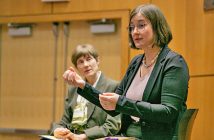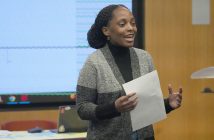Throughout World War II and the Holocaust, Pope Pius XII saw his role as a neutral diplomat, and so he spoke of the Jews’ persecution only in the formal papal language of generalities and tried to bring peace without condemning any nation. Were his efforts passive and self-serving or was he simply trying to maintain the church’s neutrality? Two scholars on the Vatican Commission, one Jesuit and one Jewish, visited Fordham’s Pope Auditorium on Nov. 9 to share their research on the conduct of Pope Pius XII during the war at the eighth annual Nostra Aetate Dialogue titled “Pope Pius XII and the Jews.” “For years, there has been controversy concerning Pope Pius XII and the claim that he was indifferent to the plight of Jews suffering in the Holocaust,” said the Rev. George Hunt, S.J., director of Fordham’s Archbishop Hughes Institute on Religion and Culture.
“To some, he is representative of leaders around the world who knew what was happening, but did nothing.” Vatican Commission members Michael Marrus, dean of the Graduate School of Holocaust Studies at the University of Toronto, and the Rev. Gerald P. Fogarty, S.J., professor of religious studies and history at the University of Virginia, based their discussion on a letter Pope Pius XII wrote to President Franklin Delano Roosevelt in July 1943. Pope Pius XII wrote about the war, saying, “I pray that everywhere civil populations will be spared the horror of war … We are calling on God to hasten the dawn of the day where all members of the vast human family have peace, justice, happiness … and love for their fellow man.”
What was explicitly missing was mention of the Jews and their persecution, said Marrus, one of several experts investigating published documents of Pope Pius XII and the Holy See during World War II. Fogarty’s assessment is that the letter was a response to Roosevelt’s assertion that the war would not end until Germany surrendered. At that time, after Sicily was invaded and Rome bombed, the war was taking a strong toll in Italy.
The pope “was shaping himself as a diplomat. This was one of his problems and one of his strong points,” Fogarty said. “There was a papal policy of impartiality, which placed the Vatican above any conflict. But even in the Vatican, people objected to the silence of the church.” Although there were no clear answers to many painful questions, the dialogue opened the lines of communication, said John W. Healey, Ph.D., the evening’s moderator and former director of the Archbishop Hughes Institute.
“We’ve made enormous progress answering some of the difficult questions,” Healey said. “There may be no answers tonight, but hopefully we can go on together with a greater mutual understanding and hope.” Fordham’s annual Nostra Aetate Dialogue can be traced to the Nostra Aetate (In Our Time) document, a declaration by the Second Vatican Council stressing the importance of relationships between the Church and non-Christian religions. The program contributes to the interfaith dialogue between Catholicism and Judaism.


